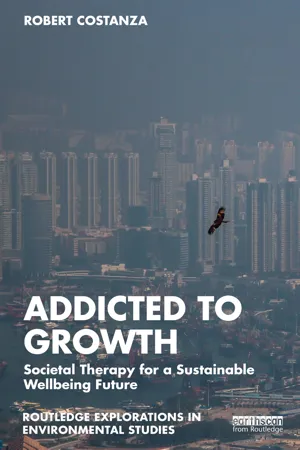
- 136 pages
- English
- ePUB (mobile friendly)
- Available on iOS & Android
About This Book
This book takes a compelling approach to describing what is needed to create the kind of future that most people on Earth really want. Our global society is hopelessly addicted to a particular vision of the world and a future that has become both unsustainable and undesirable.
Addicted to Growth frames our current predicament as a societal addiction to a 'growth at all costs' economic paradigm. While economic growth has produced many benefits, its side effects are now producing existential problems that are rapidly getting worse. Robert Costanza considers lessons from what works at the individual level to overcome addictions and applies them to a societal scale. Costanza recognises that the first step to recovery is recognising the addiction and that it is leading to disaster; however, simply pointing out the dire consequences of our societal addiction is only the first step and can be counterproductive by itself in motivating change. The key next step is creating a truly shared vision of the kind of world we all want, and the book explores creative ways to implement this societal therapy. The final step is using that shared vision to motivate the changes needed to achieve it, including adaptive transformations of our economic systems, property rights regimes, and governance institutions.
An exciting contribution from a key thinker in the field, this book will be a valuable resource to students and scholars of public policy and sustainability studies, and anyone interested in understanding and overcoming our societal addiction to growth.
Frequently asked questions
Table of contents
- Cover
- Half Title
- Series
- Title
- Copyright
- Dedication
- Contents
- List of Illustrations
- Foreword
- Preface
- Acknowledgements
- Summary
- 1 Understanding the Addiction: Where Are We and How Did We Get Here?
- 2 Acknowledging the Addiction: We Know the Problems – Why Haven’t We Solved Them?
- 3 Wellbeing Economics: A New Vision of How the World Works and How It Could Be Better
- 4 Active Therapy: Creating Shared Goals for a Sustainable and Desirable Future
- 5 Creating a Sustainable Wellbeing Future: How Do We Get From Here to There?
- 6 Sustaining a Better World in 2050 and Beyond: Ongoing Envisioning and Adaptive Management
- Epilogue
- Index